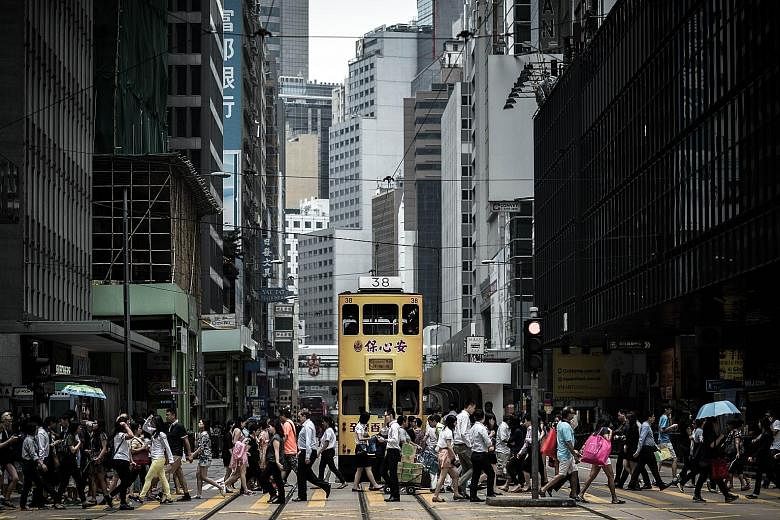Hong Kong's economy "lags" behind regional rivals Singapore and Macau because Hong Kongers have failed to "de-colonise" after the 1997 British handover, according to a former senior mainland official who oversaw the territory's affairs.
The startling assertion by Mr Chen Zuo'er, former deputy director of the State Council's Hong Kong and Macau Affairs Office (HKMAO), has, unusually, been met with a string of rebuttals from Hong Kong ministers and Beijing-friendly politicians.
Coming a week before Hong Kong marks the first anniversary of the start of the controversial Occupy movement, Mr Chen's remarks - which appear to reflect concerns that the central government's authority was being challenged in Hong Kong - have also ignited debate on whether they might presage new hardline policies by the central government towards the city.
It is the latest bout of political muscle-flexing from Beijing figures. A week ago, the central government's top man here, Liaison Office director Zhang Xiaoming, sparked alarm when he said that separation of powers does not exist in Hong Kong, and that the Chief Executive enjoys "a special legal status that transcends the executive, legislature and judiciary".
On Sunday, Mr Chen, who remains influential as chairman of the state-sponsored think-tank Chinese Association of Hong Kong and Macau Studies, told a forum audience including Chief Executive Leung Chun Ying that Hong Kong is undergoing "a revival of de-sinicisation".
"Hong Kong's failure to de-colonise in accordance to the law and instead, de-sinicise, has damaged the 'one country, two systems' framework," he said.
Mr Chen, a key negotiator in discussions leading up to the handover to Chinese rule, did not elaborate on which aspects of Hong Kong should be "de-colonised", or which law has been flouted.
But he added: "This is a bizarre phenomenon that is at odds with history, and has led to serious internal strife and time wasted in Hong Kong, along with all sorts of problems, internal and external."
This included lacklustre economic development, and Hong Kong had now fallen behind Singapore and Macau - which left him feeling "sour".
In response, Secretary for Constitutional and Mainland Affairs Raymond Tam called on Mr Chen to be "more tolerant and trusting" of Hong Kongers, while Justice Secretary Rimsky Yuen said Hong Kong's judicial and common law system inherited from the British has served it well and should be retained.
Mr Chen, however, was likely referring to the so-called nativists, a fringe movement which has gained momentum in recent years. Colonial-era flags have reappeared at protests, including during the Occupy movement, while some Hong Kongers have stoutly maintained their identity as Hong Kongers rather than as Chinese. A tiny minority are also advocating independence - which Beijing had accused the Occupy organisers of doing.
More generally, there is some nostalgia for Hong Kong's golden era of economic growth and regional cultural influence in the 1970s and 1980s under British rule.
Unsurprisingly, there is now bemusement in the city on what exactly Beijing's policy towards Hong Kong is.
A period of relative calm followed the legislature's vote down of the Beijing-endorsed universal suffrage proposal in June, with Mr Zhang saying he would refrain from talking about political matters and that Hong Kong should focus on economic development instead.
Just last month, a detente of sorts was also brokered when members of the Democratic Party met HKMAO deputy director Feng Wei.
Says political commentator Du Ping: "It's a bit of a head scratcher - what signals are they sending with such comments these few weeks?"
Over the past year, he says, Beijing has been reflecting on what led to the Occupy movement. "Was it because it was too tolerant of Hong Kong in the past, or was it due to miscommunication between its local representatives and the central government?"
Till now, he believes, Beijing has not reached a clear answer.
Muddying the waters further is the fact that there are various factions jostling to put across their narratives. Mr Chen and Mr Zhang are believed to fall into the hawkish camp, and may not necessarily reflect the thoughts of the highest echelons of the Beijing government, he adds.


